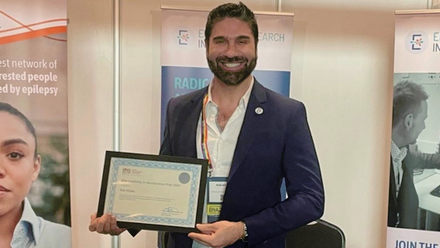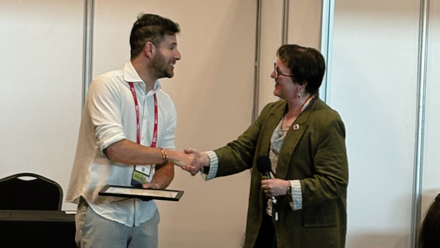Winner of the BNA Green Neuroscience Prize 2024
The BNA is delighted to announce the winner of our inaugural Green Neuroscience prize.This new prize has been introduced as part of our commitment in response to the climate emergency to raise awareness within the neuroscience sector of the urgent need to minimise the negative environmental impact of undertaking research, teaching and practice.
The prize is awarded for efforts by neuroscience researchers in making positive steps to reduce the environmental impact of their own research activities. This can include efforts such as lowering the carbon footprint within their research projects, taking steps to maximise lower carbon options for meetings and travel linked to their research, or taking part in education & outreach activities on reducing the environmental impact of research.
Creating the Green Neuroscience prize is one of the outputs from the BNA's Green Neuroscience Working Group, which was set up to help guide our activities, set targets for the BNA on carbon reduction, and raise the profile of green neuroscience within the wider neuroscience community.
IMAGEGreen Neuroscience Prize Winner 2024: Nick Souter, Postdoctural Research Fellow, University of Sussex
Nick is a postdoctoral research fellow within the School of Psychology, at the University of Sussex. He has a background in Psychology and Cognitive Neuroscience, with previous work focusing on the retrieval of semantic concepts, in stroke patients with aphasia and in neurologically healthy adults.
Nick’s current work focuses on measuring and reducing the carbon footprint of computing required in human neuroimaging research, with a specific focus on functional magnetic resonance imaging (fMRI). A highlight from this work is a review paper, recently published in Imaging Neuroscience, which provides ten recommendations for neuroimagers to decrease the carbon footprint of their computing over the complete research life cycle, from study planning to data sharing.
Nick has led initiatives and studies that will form the foundation of sustainable neuroimaging practices for the community at large. He has developed the public tool fMRIPrepCleanup, enabling users to automatically remove junk files generated by preprocessing, which constitute up to 96% of total file size (reducing server workload). He has also released a novel carbon tracking tool, in collaboration with Sussex IT.
In helping to raise awareness of the importance of the need to engage the neuroscience community on sustainable practices, Nick has spoken on this at a variety of meetings, including BNA2023 in Brighton, the international Organization for Human Brain Mapping, in addition to events at Wellcome and the British Society of Computing - and most recently, at the BNA's recent Members Meeting.
Joseph Clift, Head of Policy and Campaigns at the BNA, said:
"Our new prize shines a light on efforts by individuals already leading the way on reducing the environmental impact of their own research activities. Nick has led initiatives on making neuroimaging most sustainable, published recommendations on how researchers can achieve this, in addition to developing valuable sustainability-boosting tools to aid the neuroscience community – all within 1 year of his first postdoc."


